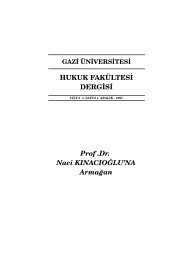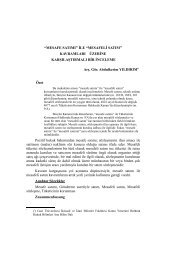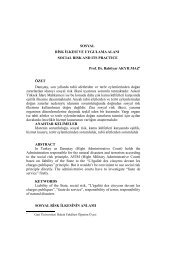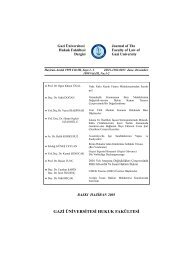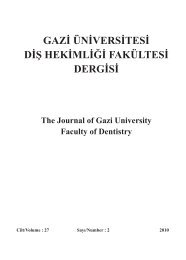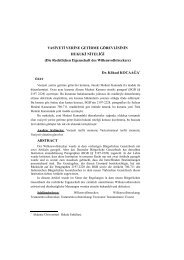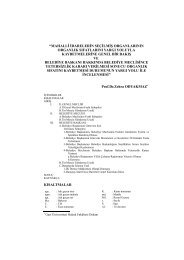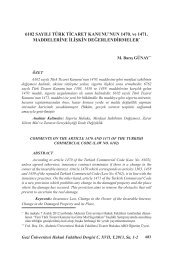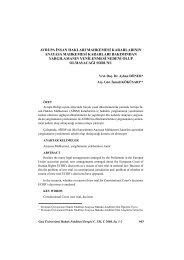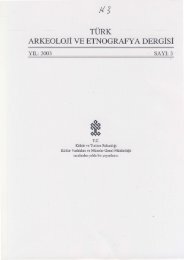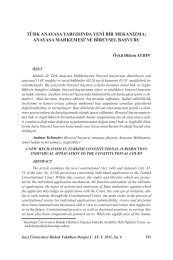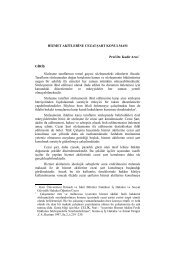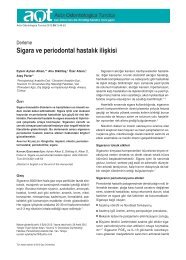- Page 3: Gazi Üniversitesi Hukuk Fakültesi
- Page 8 and 9: Gazi University Faculty of Law Revi
- Page 10: BOŞ
- Page 14 and 15: Mustafa Erdem CANzenlememektedir. A
- Page 16 and 17: Mustafa Erdem CANolmaksızın ödem
- Page 18: Mustafa Erdem CANdur (Yeni TTK m. 1
- Page 23 and 24: Limited Şirket Ortağının Borçl
- Page 25 and 26: Limited Şirket Ortağının Borçl
- Page 27 and 28: Limited Şirket Ortağının Borçl
- Page 29 and 30: Limited Şirket Ortağının Borçl
- Page 31 and 32: Limited Şirket Ortağının Borçl
- Page 33 and 34: Limited Şirket Ortağının Borçl
- Page 35 and 36: DISTORTED ARCHITECTURE OF INTERNATI
- Page 37 and 38: Distorted Architecture Of Internati
- Page 39 and 40: Distorted Architecture Of Internati
- Page 41 and 42: Distorted Architecture Of Internati
- Page 43 and 44: Distorted Architecture Of Internati
- Page 45 and 46: Distorted Architecture Of Internati
- Page 47 and 48: Distorted Architecture Of Internati
- Page 49: Distorted Architecture Of Internati
- Page 53 and 54: Distorted Architecture Of Internati
- Page 55 and 56: Distorted Architecture Of Internati
- Page 57 and 58: Distorted Architecture Of Internati
- Page 59 and 60: Distorted Architecture Of Internati
- Page 61 and 62: Distorted Architecture Of Internati
- Page 63 and 64: Distorted Architecture Of Internati
- Page 65 and 66: Distorted Architecture Of Internati
- Page 67 and 68: Distorted Architecture Of Internati
- Page 69 and 70: Distorted Architecture Of Internati
- Page 71 and 72: Distorted Architecture Of Internati
- Page 73 and 74: Distorted Architecture Of Internati
- Page 75 and 76: KÜÇÜK YAŞTA EVLENMENİN MÜEYY
- Page 77 and 78: Küçük Yaşta Evlenmenin Müeyyid
- Page 79 and 80: Küçük Yaşta Evlenmenin Müeyyid
- Page 81 and 82: Küçük Yaşta Evlenmenin Müeyyid
- Page 83 and 84: Küçük Yaşta Evlenmenin Müeyyid
- Page 85 and 86: Küçük Yaşta Evlenmenin Müeyyid
- Page 87: Küçük Yaşta Evlenmenin Müeyyid
- Page 90 and 91: Dilşad KESKİNlerini düzenleyen M
- Page 92 and 93: Dilşad KESKİNmiş olmaktadır. Bu
- Page 94 and 95: BOŞ
- Page 96 and 97: BOŞ
- Page 98: Süheyla ALICAGİRİŞÇevre kirlil
- Page 102 and 103:
Süheyla ALICAbileceği öngörülm
- Page 104 and 105:
Süheyla ALICAAnılan Yönetmeliğe
- Page 106 and 107:
Süheyla ALICAde verilecek kararın
- Page 108 and 109:
Süheyla ALICAluluğu ise, “kusur
- Page 110 and 111:
Süheyla ALICAnın belirlenmesi sor
- Page 112 and 113:
Süheyla ALICAsi amacı ile “kirl
- Page 114 and 115:
Süheyla ALICA“faaliyetleri sıra
- Page 116 and 117:
Süheyla ALICAÇevre sorunlarına i
- Page 118 and 119:
Süheyla ALICAErgene Nehri kirlili
- Page 120 and 121:
Süheyla ALICAdığı gibi izin ver
- Page 122 and 123:
Süheyla ALICArunun da değerlendir
- Page 124 and 125:
Süheyla ALICAbilinen çevre hakkı
- Page 126 and 127:
Süheyla ALICASONUÇGörüldüğü
- Page 128 and 129:
Süheyla ALICAIŞIKLAR, Celal, “A
- Page 130 and 131:
BOŞ
- Page 132 and 133:
Öykü Didem AYDINtion of the indid
- Page 134 and 135:
Öykü Didem AYDINII. Bireysel Baş
- Page 136 and 137:
Öykü Didem AYDINgı organları ka
- Page 138 and 139:
Öykü Didem AYDINler Anayasada gü
- Page 140 and 141:
Öykü Didem AYDIN1, 4 ,6, 7, 12, 1
- Page 142 and 143:
Öykü Didem AYDINren hak ve özgü
- Page 144 and 145:
Öykü Didem AYDIN21) Bir suçtan h
- Page 146 and 147:
Öykü Didem AYDINİhlalin var olup
- Page 148 and 149:
Öykü Didem AYDINBireyler için ba
- Page 150 and 151:
Öykü Didem AYDINYine Alman “ana
- Page 152 and 153:
Öykü Didem AYDINkemesi temel hakl
- Page 154 and 155:
Öykü Didem AYDINde bu mesele nas
- Page 156 and 157:
Öykü Didem AYDINlemleri açısın
- Page 158 and 159:
Öykü Didem AYDINÜlkemizde de bu
- Page 160 and 161:
Öykü Didem AYDINVatansızlar da b
- Page 162 and 163:
Öykü Didem AYDINğımlılığı,
- Page 164 and 165:
Öykü Didem AYDIN3. Eylem ya da İ
- Page 166 and 167:
Öykü Didem AYDIND. Bireysel başv
- Page 168 and 169:
Öykü Didem AYDINkomisyonların ya
- Page 170 and 171:
Öykü Didem AYDINduğu takdirde ih
- Page 172 and 173:
Öykü Didem AYDINgılama sürecind
- Page 174 and 175:
Öykü Didem AYDINrir. Bireysel ba
- Page 176 and 177:
Öykü Didem AYDINKötüye kullanma
- Page 178 and 179:
Öykü Didem AYDINduğu bağımsız
- Page 180 and 181:
Öykü Didem AYDINPIMENTEL, Genaro
- Page 182 and 183:
Celalettin GÜNGÖRThe state was a
- Page 184 and 185:
Celalettin GÜNGÖRdoğan o işleyi
- Page 186 and 187:
Celalettin GÜNGÖRPapa’nın ikti
- Page 188 and 189:
Celalettin GÜNGÖRdı. Papa Bonifa
- Page 190 and 191:
Celalettin GÜNGÖR19. yüzyılın
- Page 192 and 193:
Celalettin GÜNGÖRMarsilius, 1326
- Page 194 and 195:
Celalettin GÜNGÖRrın acımasız
- Page 196 and 197:
Celalettin GÜNGÖRDevlet (regnum)
- Page 198 and 199:
Celalettin GÜNGÖRde davranmışt
- Page 200 and 201:
Celalettin GÜNGÖRYeterli yaşam u
- Page 202 and 203:
Celalettin GÜNGÖRsınıfı” 59
- Page 204 and 205:
Celalettin GÜNGÖRdı. Fakat Adem,
- Page 206 and 207:
Celalettin GÜNGÖRlinlerle mükemm
- Page 208 and 209:
Celalettin GÜNGÖRlediği konusuna
- Page 210 and 211:
Celalettin GÜNGÖRzıldığı gibi
- Page 212 and 213:
Celalettin GÜNGÖRşan ve Marsiliu
- Page 214 and 215:
Celalettin GÜNGÖRYasa da zorunlu
- Page 216 and 217:
Celalettin GÜNGÖRDolayısıyla ya
- Page 218 and 219:
Celalettin GÜNGÖRna olağandış
- Page 220 and 221:
Celalettin GÜNGÖRsonra ancak yap
- Page 222 and 223:
Celalettin GÜNGÖRna da bırakılm
- Page 224 and 225:
Celalettin GÜNGÖRmokrasi lehinde
- Page 226 and 227:
Celalettin GÜNGÖRDolayısıyla is
- Page 228 and 229:
Celalettin GÜNGÖRŞu an bir gör
- Page 230 and 231:
Celalettin GÜNGÖRSONUÇDefensor P
- Page 232 and 233:
Celalettin GÜNGÖRDoğuşu”, Dev
- Page 234 and 235:
Zeynetl T. KANGALI. GirişTCK md. 2
- Page 236 and 237:
Zeynetl T. KANGALhasta tıbbî müd
- Page 238 and 239:
Zeynetl T. KANGAL2. Zorunluluk Duru
- Page 240 and 241:
Zeynetl T. KANGALTrechsel/Noll da v
- Page 242 and 243:
Zeynetl T. KANGALlaştırılması,
- Page 244 and 245:
Zeynetl T. KANGALrızasının alın
- Page 246 and 247:
Zeynetl T. KANGALedilebiliyorsa, ta
- Page 248 and 249:
Zeynetl T. KANGALBilinci yerinde ol
- Page 250 and 251:
Zeynetl T. KANGALşansı mevcut old
- Page 252 and 253:
Zeynetl T. KANGALelmann ise, bu tü
- Page 254 and 255:
Zeynetl T. KANGALbulunduğu takdird
- Page 256 and 257:
Zeynetl T. KANGALuyarı fonksiyonu
- Page 258 and 259:
Zeynetl T. KANGALKAYNAKÇABAUMANN,
- Page 260 and 261:
Zeynetl T. KANGALMAURACH, Reinhart/
- Page 262 and 263:
BOŞ
- Page 264 and 265:
Belkıs KONANwas further developed
- Page 266 and 267:
Belkıs KONANBu özelliklere ek ola
- Page 268 and 269:
Belkıs KONANÇinli generallerin,
- Page 270 and 271:
Belkıs KONANÖlenin yakınları (a
- Page 272 and 273:
Belkıs KONANnin mümkün olmaması
- Page 274 and 275:
Belkıs KONANsiz ki sizin Allah nez
- Page 276 and 277:
Belkıs KONANleliğin İslamda nede
- Page 278 and 279:
Belkıs KONANrekelerinin artık mü
- Page 280 and 281:
Belkıs KONANküm veliyedin” (Siz
- Page 282 and 283:
Belkıs KONANtazminidir. Öte yanda
- Page 284 and 285:
Belkıs KONANkarşımıza çıkan i
- Page 286 and 287:
Belkıs KONANbir vergi-i münasib t
- Page 288 and 289:
Belkıs KONANAnayasanın mimarı ol
- Page 290 and 291:
Belkıs KONANmiş olduğundan her t
- Page 292 and 293:
Belkıs KONANİncelediğimiz bir ba
- Page 294 and 295:
Belkıs KONANmat, Islahat Fermanlar
- Page 296 and 297:
Belkıs KONANİNALCIK, Halil, Osman
- Page 298 and 299:
Belkıs KONANBOA, 29 M 1172 H. , 32
- Page 300 and 301:
Hikmet TÜLENrepresent a nearly equ
- Page 302 and 303:
Hikmet TÜLENbölünmek suretiyle b
- Page 304 and 305:
Hikmet TÜLEN- Anayasa Mahkemesinin
- Page 306 and 307:
Hikmet TÜLENTek İsimli Seçim - L
- Page 308 and 309:
Hikmet TÜLENracak küçük seçim
- Page 310 and 311:
Hikmet TÜLENte bir olay (bir hük
- Page 312 and 313:
Hikmet TÜLENŞayet ülkenin tamam
- Page 314 and 315:
Hikmet TÜLENAnayasanın 80. maddes
- Page 316 and 317:
Hikmet TÜLENdar gidebilir. Pratikt
- Page 318 and 319:
Hikmet TÜLENtarlı bir şekilde ne
- Page 320 and 321:
Hikmet TÜLENnunla birlikte, 2010 y
- Page 322 and 323:
Hikmet TÜLENlerin nüfusunun esas
- Page 324 and 325:
Hikmet TÜLENEdirne 390.428 300.301
- Page 326 and 327:
Hikmet TÜLENKarabük 227.610 164.1
- Page 328 and 329:
Hikmet TÜLENAmasya 234.223 3 78.07
- Page 330 and 331:
Hikmet TÜLEN16 Nevşehir 125.146 1
- Page 332 and 333:
Hikmet TÜLEN72 İzmir 19.052 -73
- Page 334 and 335:
Hikmet TÜLENKAYNAKÇAARASLI, Oya:
- Page 336:
BOŞ



